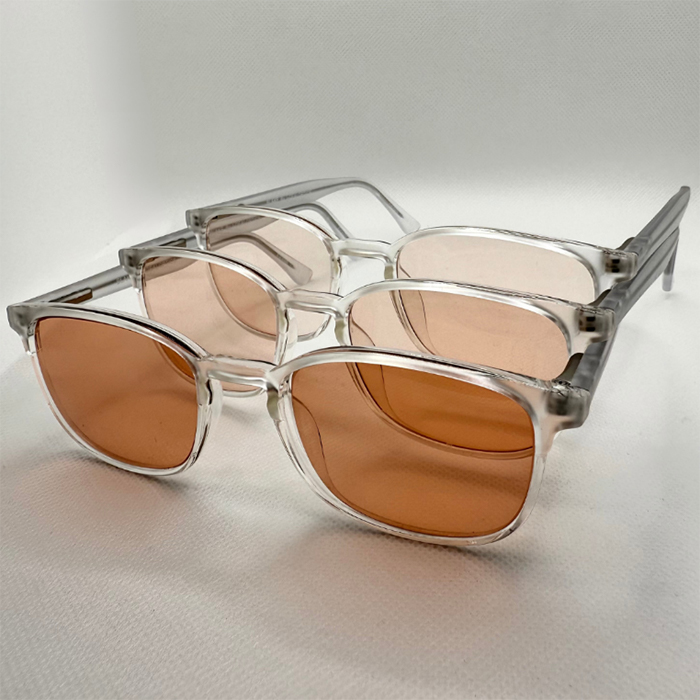FL-41 Tint
FL-41 is rose colored tint designed for patients with light sensitivity and most recommended for patients with migraine, post-concussion syndrome, and other light-sensitive eye conditions. FL-41 tint can be done with varying levels of density with the higher percentage being darker (i.e., 10% - lighter; 50% - darker).

FAQs:
1. How does FL-41 work?
Prescription lenses that are tinted with FL-41 block approximately 80% of blue light—within the spectrum of 480-520 nanometers (nm). It has also been noted that FL-41 tint modulates conventional fluorescent lighting that emits an invisible “flicker” or modulation at specific wavelengths of light that can cause problems for patients with acquired/traumatic brain injuries. FL-41 also may provide relief under artificial fluorescents and even device screens that produce a similar effect.
2. Are there any adverse side effects?
Although FL-41 was developed primarily for people with migraine-related light sensitivity, traumatic/acquired brain injury patients with vision-related symptoms, retinal conditions, migraine with light sensitivity, and many other eye conditions.
3. Are there any adverse side effects?
No known adverse side effects are known.
4. FL-41 glasses vs regular sunglasses:
FL-41 tint targets the blue light spectrum, which makes them the preferred substitute for indoor use over regular, dark sunglasses. FL-41 lenses tinted for indoors do not have to be nearly as dark; therefore, do not risk the complications of ocular dark adaptation and social isolation. However, FL-41 can separately be applied to a darker and polarized lens, making them the best sunglasses you could ever own.
5. What is the research on FL-41 tint?
1. Tatsumoto M, Suzuki E, Nagata M, Suzuki K, Hirata K. Prophylactic Treatment for Patients with Migraine Using Blue Cut for Night Glass. Internal Medicine. 2022;62(6):0132-22. doi:10.2169/internalmedicine.0132-22
2. Huang J, Zong X, Wilkins A, Jenkins B, Bozoki A, Cao Y. fMRI evidence that precision ophthalmic tints reduce cortical hyperactivation in migraine. Cephalalgia. 2011;31(8):925-936. doi:10.1177/0333102411409076
3. Good PA, Taylor RH, Mortimer MJ. The Use of Tinted Glasses in Childhood Migraine. Headache: The Journal of Head and Face Pain. 1991;31(8):533-536. doi:10.1111/j.1526-4610.1991.hed3108533.x
4. Merezhinskaya N, Bai AC, Park D, Barker II FM, Gu W. Characterization of Mild Traumatic Brain Injury Cohort With Photophobia From the Defense and Veterans Eye Injury and Vision Registry. Mil Med. 2024;189(Supplement_3):736-742. doi:10.1093/milmed/usae251
5. Clark J, Hasselfeld K, Bigsby K, Divine J. Colored Glasses to Mitigate Photophobia Symptoms Posttraumatic Brain Injury. J Athl Train. 2017;52(8):725-729. doi:10.4085/1062-6050-52.4.04
6. Blackburn MK, Lamb RD, Digre KB, et al. FL-41 Tint Improves Blink Frequency, Light Sensitivity, and Functional Limitations in Patients with Benign Essential Blepharospasm. Ophthalmology. 2009;116(5):997-1001. doi:10.1016/j.ophtha.2008.12.031
7. Reyes N, Huang JJ, Choudhury A, et al. FL-41 Tint Reduces Activation of Neural Pathways of Photophobia in Patients with Chronic Ocular Pain. Am J Ophthalmol. 2024;259:172-184. doi:10.1016/j.ajo.2023.12.004
8. Lamb RD, Digre KB, Smith ; A Gordon, et al. Electromyographic Evidence That FL-41 Tinted Spectacles Decrease Blink Frequency and Force in Benign Essential Blepharospasm.; 2006.
Insurance FAQs on FL-41 tint
1. Does medical insurance cover FL-41 tint?
Some medical insurers do provide coverage for FL-41 tint; however, this is evaluated on a case-by-case basis. You can use your FSA or HAS card to purchase FL-41 tint.
2. Does workers’ compensation or auto insurance cover FL-41 tint?
This is evaluated on a case-by-case basis based upon your neuro-optometrist medical orders and the terms of individual workers’ comp and auto insurance policies. Typically, coverage exists based upon the findings of the neuro-optometry examination.
3. Does vision discount plans (EyeMed, VSP, Avesis, Davis, etc.) cover Avulux tint?
Please check your individual plan.









